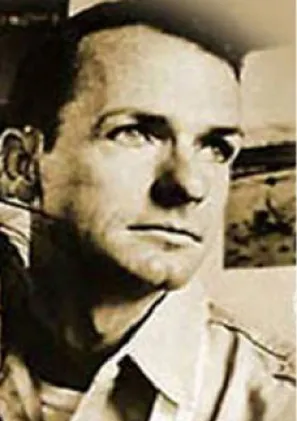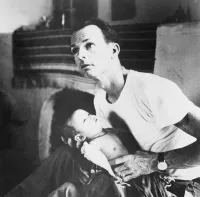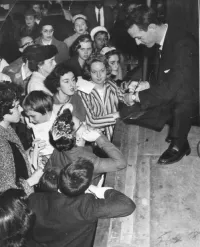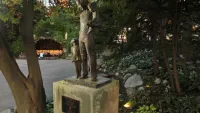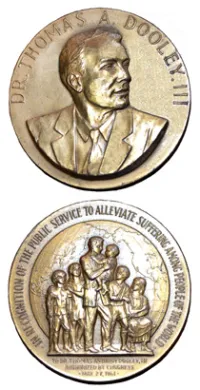Biography
1927 - 1961
“Dedicate some of your life to others. Your dedication will not be a sacrifice. It will be an exhilarating experience because it is an intense effort applied toward a meaningful end.”
– Thomas Dooley
As a navy doctor, Dooley supervised a medical assistance program for more than 600,000 refugees fleeing from North Vietnam to the south in 1954. Dooley later established a network of hospitals and clinics in Southeast Asia to serve the rural poor. To share what he learned, he did lectures and wrote books including Deliver Us from Evil. Dooley—who was considered America's answer to renowned humanitarian German French polymath Albert Schweitzer—was named the seventh most-admired man in the U.S. in a 1959 Gallup poll. That same year, following an anonymous tip, the Navy launched an elaborate six-week investigation—that included wire-tapping private phones and monitoring his personal contacts—which resulted in Lieutenant Dr. Tom Dooley being threatened with a dishonorable discharge from the military for being gay. His willingness to cooperate with authorities, who burnished his reputation to leverage public support for the Vietnam War, was rewarded with an Honorable Discharge. This has made him a figure of controversy in many quarters. The internecine machinations behind his legend are a perfect example of the many "accommodations" the military and the State Department granted to some gay people for political reasons, while others, who were deemed expendable, had their lives destroyed by those same forces. In contrast, Dooley—a man caught in the crosshairs of history at the same time he was revealed to be gay—was hailed as an inspirational example of one man's commitment to a greater cause when President John F. Kennedy launched the Peace Corps citing Dooley’s service as an example of the work that new organization could provide ... proof that history is seldom as clear-cut as we are led to believe. Dooley was posthumously awarded the Congressional Gold Medal in 1961. A statue dedicated to his honor stands at the University of Notre Dame.
1927 - 1961
“Dedicate some of your life to others. Your dedication will not be a sacrifice. It will be an exhilarating experience because it is an intense effort applied toward a meaningful end.”
– Thomas Dooley
As a navy doctor, Dooley supervised a medical assistance program for more than 600,000 refugees fleeing from North Vietnam to the south in 1954. Dooley later established a network of hospitals and clinics in Southeast Asia to serve the rural poor. To share what he learned, he did lectures and wrote books including Deliver Us from Evil. Dooley—who was considered America's answer to renowned humanitarian German French polymath Albert Schweitzer—was named the seventh most-admired man in the U.S. in a 1959 Gallup poll. That same year, following an anonymous tip, the Navy launched an elaborate six-week investigation—that included wire-tapping private phones and monitoring his personal contacts—which resulted in Lieutenant Dr. Tom Dooley being threatened with a dishonorable discharge from the military for being gay. His willingness to cooperate with authorities, who burnished his reputation to leverage public support for the Vietnam War, was rewarded with an Honorable Discharge. This has made him a figure of controversy in many quarters. The internecine machinations behind his legend are a perfect example of the many "accommodations" the military and the State Department granted to some gay people for political reasons, while others, who were deemed expendable, had their lives destroyed by those same forces. In contrast, Dooley—a man caught in the crosshairs of history at the same time he was revealed to be gay—was hailed as an inspirational example of one man's commitment to a greater cause when President John F. Kennedy launched the Peace Corps citing Dooley’s service as an example of the work that new organization could provide ... proof that history is seldom as clear-cut as we are led to believe. Dooley was posthumously awarded the Congressional Gold Medal in 1961. A statue dedicated to his honor stands at the University of Notre Dame.
Lesson Plan
Please login or register for an account to view this lesson plan.
Demography
Demography
Gender Male
Sexual Orientation Gay
Gender Identity Cisgender
Ethnicity Caucasian/White
Faith Construct Catholic
Nations Affiliated Laos United States
Era/Epoch Cold War (1945-1991) Vietnam War (1955-1975)
Field(s) of Contribution
Author
Medicine
Military
Science
Social Justice
Social Sciences
STEM & Medicine
US History
Commemorations & Honors
Dr. Tom Dooley Society of Notre Dame
University of Notre Dame and Saint Mary's College LGBT Allumni Annual Thomas A. Dooley Award
Medical International Cooperation Organization Founder
Navy Legion of Merit Awardee (1955)
Posthumous Congressional Gold Medal Awardee (1961)
Posthumous Army Distinguished Service Medal (1969)
Statue Dedicated to Dooley at University of Notre Dame (1986)
Demography
Gender Male
Sexual Orientation Gay
Gender Identity Cisgender
Ethnicity Caucasian/White
Faith Construct Catholic
Nations Affiliated Laos United States
Era/Epoch Cold War (1945-1991) Vietnam War (1955-1975)
Field(s) of Contribution
Author
Medicine
Military
Science
Social Justice
Social Sciences
STEM & Medicine
US History
Commemorations & Honors
Dr. Tom Dooley Society of Notre Dame
University of Notre Dame and Saint Mary's College LGBT Allumni Annual Thomas A. Dooley Award
Medical International Cooperation Organization Founder
Navy Legion of Merit Awardee (1955)
Posthumous Congressional Gold Medal Awardee (1961)
Posthumous Army Distinguished Service Medal (1969)
Statue Dedicated to Dooley at University of Notre Dame (1986)
Resources
Resources
Fisher, James T. Dr. America: The Lives of Thomas A. Dooley. Amerst: University of Massachusetts Press, 1998.
http://www.nytimes.com/books/first/f/fisher-america.html
http://www.galandsmc.org/the-thomas-a-dooley-award/
https://www.latimes.com/archives/la-xpm-1991-12-15-tm-868-story.html
https://www.baltimoresun.com/news/bs-xpm-1993-04-16-1993106012-story.html
https://lgbt.wikia.org/wiki/Thomas_Anthony_Dooley
https://ndsmcobserver.com/2016/10/nd-honors-legacy-of-tom-dooley/
Resources
Fisher, James T. Dr. America: The Lives of Thomas A. Dooley. Amerst: University of Massachusetts Press, 1998.
http://www.nytimes.com/books/first/f/fisher-america.html
http://www.galandsmc.org/the-thomas-a-dooley-award/
https://www.latimes.com/archives/la-xpm-1991-12-15-tm-868-story.html
https://www.baltimoresun.com/news/bs-xpm-1993-04-16-1993106012-story.html
https://lgbt.wikia.org/wiki/Thomas_Anthony_Dooley
https://ndsmcobserver.com/2016/10/nd-honors-legacy-of-tom-dooley/
